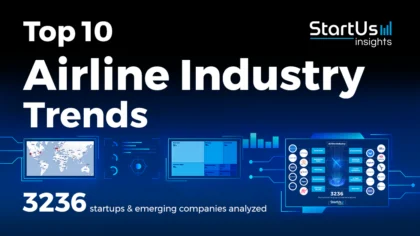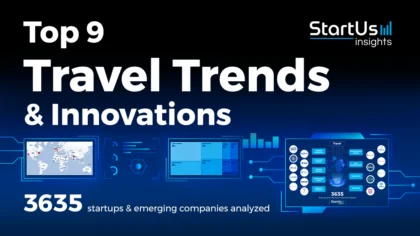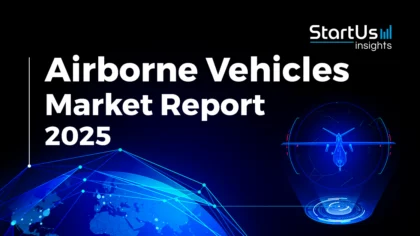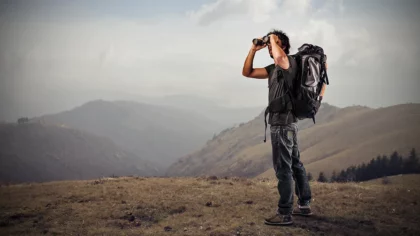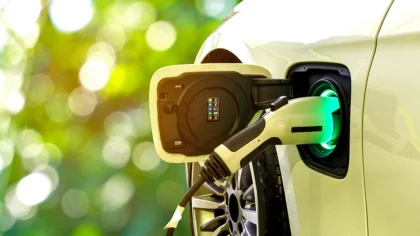The tourism industry is innovating to tackle overcrowding, resource management, and evolving traveler expectations while opening avenues for growth through travel technology. These technologies, including AI, augmented reality (AR) and virtual reality (VR), big data and analytics, and more enable personalized travel experiences, immersive destination tours, and data-driven decision-making. Startups across the globe are leveraging these emerging technologies to advance the sector.
For instance, TrustLink offers passive liveness detection technology that enhances security and reduces fraud through biometric integration. Similarly, Truely offers an eSIM solution for uninterrupted mobile service across multiple countries. As these advancements reshape the landscape, innovation managers, product developers, and business developers must adapt quickly to remain competitive in a rapidly evolving market. This article offers valuable insights into the latest technological trends and practical solutions to integrate into business strategies and navigate the future of tourism.
Why should you read this report?
- Gain insights into the top 10 technologies impacting travel & tourism.
- Learn about three practical use cases for each technology.
- Meet 10 innovative startups advancing these technologies.

Key Takeaways
- Artificial Intelligence (AI)
- Use Cases:
- Personalized Travel Recommendations
- Dynamic Pricing
- Customer Service Chatbots
- Startup to Watch: ZYTLYN Technologies
- Use Cases:
- Augmented Reality (AR) & Virtual Reality (VR)
- Use Cases:
- Virtual Tours of Destinations
- AR Guides and Information
- Immersive Travel Booking
- Startup to Watch: AR Trails
- Use Cases:
- Big Data & Analytics
- Use Cases:
- Market Trend Analysis
- Customer Preference Insights
- Operational Efficiency Optimization
- Startup to Watch: Konzup
- Use Cases:
- Biometrics
- Use Cases:
- Biometric Check-ins
- Enhanced Security
- Personalized Guest Experiences
- Startup to Watch: TrustLink
- Use Cases:
- Blockchain
- Use Cases:
- Secure Booking and Payment
- Identity Verification
- Customer Loyalty Programs
- Startup to Watch: LynKey
- Use Cases:
- CleanTech
- Use Cases:
- Sustainable Accommodations
- Eco-friendly Transportation
- Energy-efficient Tourism
- Startup to Watch: BehaviorSMART
- Use Cases:
- Cloud Computing
- Use Cases:
- Cloud-based Booking Systems
- Customer Relationship Management
- Personalized Services
- Startup to Watch: Triparound
- Use Cases:
- Connectivity Technologies
- Use Cases:
- NFC-based Contactless Payments
- Wi-Fi in Tourist Attractions
- Connectivity for Travel Apps
- Startup to Watch: Truely
- Use Cases:
- Internet of Things (IoT)
- Use Cases:
- Smart Hotels
- Personalized Guest Experiences
- Travel and Tour Management
- Startup to Watch: LiXiA
- Use Cases:
- Advanced Robotics
- Use Cases:
- Customer Service Robots
- Robotic Guides
- Automated Transport
- Startup to Watch: Senxeed Robotics
- Use Cases:
Tourism Industry FAQs
What are the challenges facing the tourism industry?
The tourism industry needs to align consumer behavior with sustainable practices. The “say-do-gap” where travelers prefer sustainable options but do not consistently act on them, remains a hurdle. Further, geopolitical instability, such as conflicts and economic downturns, poses risks to tourism in affected regions. Climate change and the increasing frequency of extreme weather events also present long-term challenges that require coordinated global efforts to ensure the sector’s resilience.
Is the tourism industry growing?
The tourism industry is experiencing growth driven by global demand for travel and the easing of COVID-19 restrictions. International tourist arrivals have almost returned to pre-pandemic levels, and the industry’s contribution to global GDP is expected to grow from 9.1% in 2023 to 11.4% by 2034.
This growth is also fueled by the increasing role of tourism in creating economic opportunities and addressing unemployment, particularly in developing regions. Moreover, as consumers prioritize sustainability, there is a rising demand for eco-friendly travel options, which is reshaping the industry’s offerings.
How We Identify Emerging Technologies & Startups
The data in this report originates from StartUs Insights’ Discovery Platform, covering 4.7 million global startups, scaleups, and technology companies, alongside 20000 emerging technology trends. Our platform makes startup and technology scouting, trend intelligence, and patent searches more efficient by providing deep insights into the technological ecosystem. Utilizing the trend intelligence feature, we analyze industry-specific technologies for this report, detect patterns and trends, and identify use cases along with the startups advancing these areas. Further details and capabilities are accessible via the website.
10 Emerging Technologies Impacting the Future of Tourism [2025 & Beyond]
1. Artificial Intelligence

Artificial intelligence (AI) streamlines operations and enhances guest experiences. Machine learning enables tourism companies to analyze large datasets, and uncover patterns to inform decision-making and trend forecasting. Natural language processing (NLP) allows AI systems to understand and respond to customer inquiries in real time. These technologies create more efficient, personalized, and responsive tourism services.
3 Practical Use Cases of Artificial Intelligence in Tourism
- Personalized Travel Recommendations: AI analyzes past behaviors and preferences to offer custom suggestions on activities, dining, and local attractions that align with tourists’ unique interests.
- Dynamic Pricing: AI algorithms monitor real-time data, including demand and competitor pricing, to dynamically adjust rates for flights and accommodations.
- Customer Service Chatbots: AI-powered chatbots handle inquiries, facilitate bookings, and offer personalized support to improve service efficiency and customer satisfaction.
Startup to Watch: ZYTLYN Technologies
Swiss startup ZYTLYN Technologies provides AI-powered travel demand predictions to enhance decision-making and optimize operations. Its platform uses global proprietary data, such as travel, macroeconomic, health, and event indicators, to deliver precise daily predictions at the city-pair level. The startup’s machine learning model continuously retrains and ensures accuracy and reliability in route development, capacity allocation, and marketing efforts. Through its web application, ZYTLYN Technologies offers real-time insights and enables businesses to navigate changing market conditions and maximize profitability without relying on customer data.
2. Augmented Reality & Virtual Reality

AR overlays digital elements in the real world that allow tourists to enrich their surroundings with real-time information and virtual objects via smartphones or smart glasses. VR, on the other hand, creates fully immersive environments that enable them to explore destinations in simulated settings through VR headsets. These technologies utilize advanced 3D modeling, location-based data integration, and spatial audio to provide hyper-realistic travel experiences.
3 Practical Use Cases of AR & VR in Tourism
- Virtual Tours of Destinations: Travelers explore locations from their homes through immersive virtual tours and gain a realistic preview of attractions and landmarks before booking.
- AR Guides and Information: AR provides real-time information through smartphones and enriches sightseeing by overlaying cultural insights, historical facts, and navigation details onto physical landmarks.
- Immersive Travel Booking: VR allows travelers to virtually explore hotel rooms and amenities, making them more confident in booking decisions.
Startup to Watch: AR Trails
Armenian startup AR Trails offers an AR app that enhances travel experiences with interactive digital content. It allows travelers to explore global trails with location-based audio, video, and 3D models. The AR Trails Creator’s Studio provides tools and a 3D model generator to create and sell personalized AR trails. The startup’s platform connects travelers with creators and delivers insights and immersive exploration.
3. Big Data & Analytics

In the tourism industry, big data enables the analysis of vast datasets to optimize decision-making and improve traveler experiences. Predictive analytics tools and machine learning algorithms process data from sources like social media, booking platforms, and geolocation data to identify patterns and trends that offer insights into traveler behavior and preferences. Data lakes and cloud-based platforms manage the immense volume of structured and unstructured data to facilitate real-time processing and scalability.
3 Practical Use Cases of Big Data & Analytics in Tourism
- Market Trend Analysis: Tourism companies use big data and analytics to predict market trends, optimize pricing strategies, align offerings with emerging travel patterns, and maintain competitiveness.
- Customer Preference Insights: Big data & analytics provide insights into individual preferences by analyzing behavioral data that allows businesses to deliver personalized experiences and improve customer satisfaction.
- Operational Efficiency Optimization: By identifying inefficiencies and optimizing resource allocation, tourism businesses reduce costs and improve service delivery.
Startup to Watch: Konzup
Brazilian startup Konzup develops Konzup Hub, a big data platform that delivers actionable insights and data-driven solutions for companies in the tourism sector. The platform aggregates data from various sources, including travel trends, customer behavior, and market conditions, to provide precise and dynamic analytics. It integrates algorithms and machine learning to predict market trends, optimize pricing strategies, and enhance customer experiences.
4. Biometrics

Leveraging technologies such as facial recognition, fingerprints, and iris scans, biometrics enhances security and streamlines processes. Tourism operators integrate unique biological traits to reduce manual checks and make travel more efficient and secure. This tourism technology is increasingly present throughout the traveler’s journey, from check-ins to border security, and provides convenience.
3 Practical Use Cases of Biometrics in Tourism
- Biometric Check-ins: Facial recognition and fingerprint scans enable travelers to bypass traditional registration, which reduces wait times and enables seamless identity verification.
- Enhanced Security: Biometric systems strengthen security by allowing only authorized individuals access to restricted areas and minimize the risk of identity fraud.
- Personalized Guest Experiences: Hotels recognize repeat customers through biometrics and customize amenities to personalize guest experiences.
Startup to Watch: TrustLink
Indonesian startup TrustLink offers passive liveness detection technology for identity verification processes. This solution analyzes subtle biometric signals in real time to ensure the individual being verified is physically present and not using a spoofed identity. It operates without requiring active user interaction, which minimizes disruptions during the verification process. TrustLink’s solution reduces fraud, streamlines check-ins, and ensures compliance with security standards within the travel industry.
5. Blockchain

Blockchain enhances security, transparency, and efficiency in transactions and data management within the tourism sector. Distributed ledger technology (DLT) enables decentralized networks to record transactions securely and tamper-proof. Smart contracts automate agreements and ensure that specific conditions are met before completing transactions. Further, blockchain-powered tokenization allows the digital representation of assets like loyalty points or bookings to facilitate secure transfers between users.
3 Practical Use Cases of Blockchain in Tourism
- Secure Booking and Payment: Blockchain enables secure transactions using smart contracts to reduce fraud risks and offers real-time transparency in bookings without intermediaries.
- Identity Verification: Blockchain stores traveler credentials on an immutable ledger to enable real-time identity verification at checkpoints.
- Customer Loyalty Programs: Blockchain-based loyalty programs provide a secure, transparent way to earn and redeem rewards across multiple platforms and improve customer engagement.
Startup to Watch: LynKey
British Virgin Islands-based startup LynKey creates a blockchain-powered ecosystem that enhances transparency, efficiency, and user engagement in the tourism and property sectors. The platform tokenizes luxury resorts, properties, and services that allow transactions through smart contracts. The startup’s blockchain technology provides secure, immutable records of ownership, bookings, and payments and creates a trustworthy environment for investors and travelers. The LYNK Wallet supports holding LYNK tokens and NFTs and offers transfer and swap features within the ecosystem. Further, LynKey’s NFT Marketplace offers a platform for smart tourism that allows buying and selling travel products, services, and experiences as NFTs using the LYNK token.
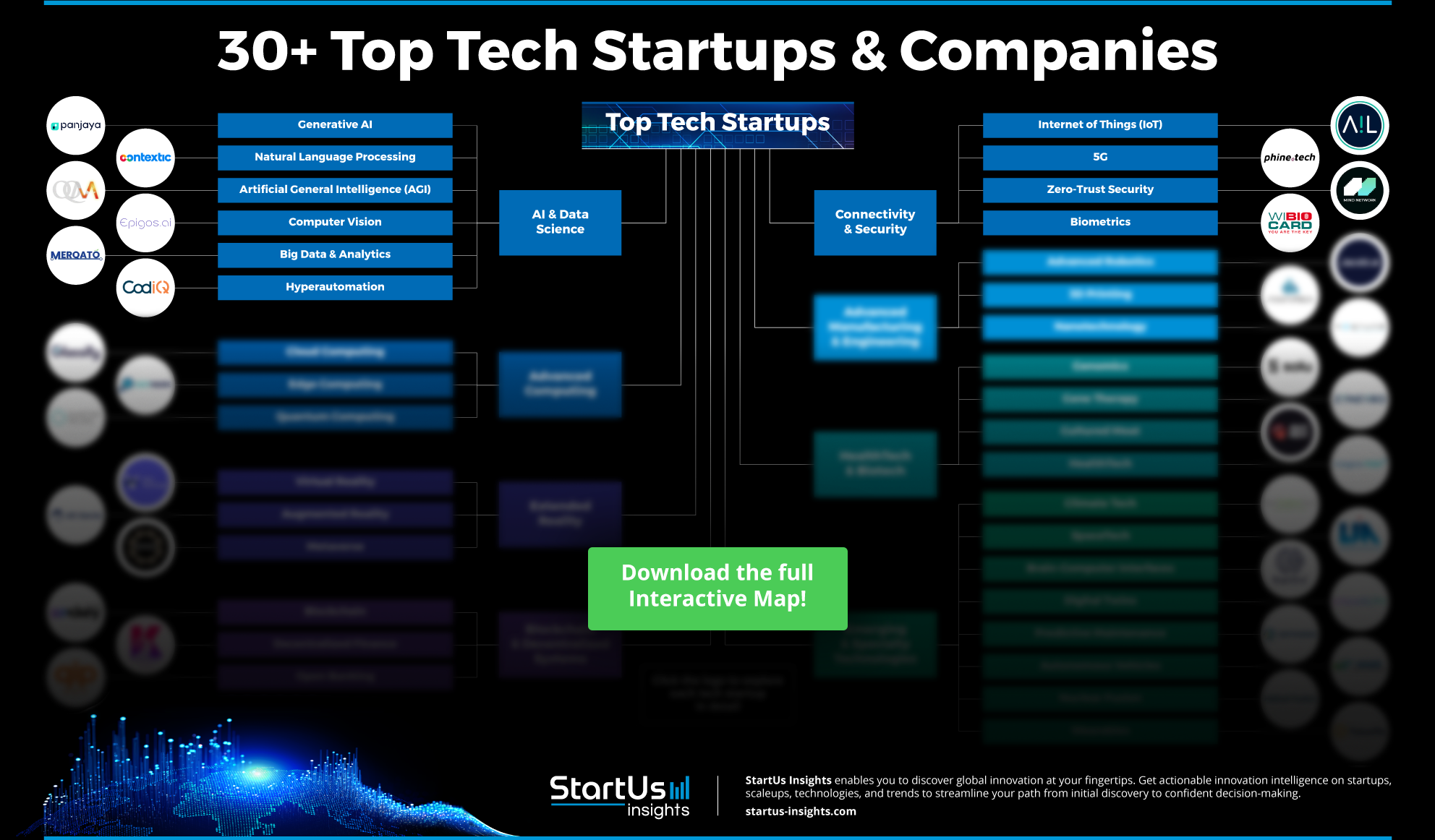
6. CleanTech

As the tourism industry faces pressure to lower its carbon footprint, cleantech provides innovative solutions that drive energy efficiency and resource conservation. Renewable energy technologies generate clean power for resorts and tourism facilities to reduce dependence on fossil fuels. Energy-efficient systems, including smart grids and building automation, optimize energy consumption in real time and improve operational efficiency.
3 Practical Use Cases of CleanTech in Tourism
- Sustainable Accommodations: Incorporating energy-efficient systems like solar panels and waste recycling allows travelers to enjoy eco-friendly stays without compromising comfort.
- Eco-friendly Transportation: The use of electric vehicles and alternative fuels reduces carbon emissions and makes travel more sustainable and environmentally friendly.
- Energy-efficient Tourism: The adoption of smart energy management systems (EMS) in tourism facilities optimizes energy consumption and reduces operational costs and environmental impact.
Startup to Watch: BehaviorSMART
Bulgarian startup BehaviorSMART develops beSMART, a behavioral science-based platform to enhance sustainability in the tourism sector. The platform leverages behavioral insights and provides actions tailored to various businesses, such as destinations, hotels, restaurants, and service providers. The startup guides businesses to set sustainability goals and follow personalized journeys. BehaviorSMART adjusts recommendations to fit specific business needs and measures the impact of business and supplier actions.
7. Cloud Computing

Tourism companies leverage cloud computing for managing data and operations. Infrastructure-as-a-service (IaaS) offers on-demand computing power and storage that enables businesses to scale resources as needed, especially during peak season. Platform-as-a-service (PaaS) streamlines application development and deployment to offer innovative digital services for travelers. Additionally, cloud-based data analytics platforms process large volumes of data in real-time to enhance decision-making and operational efficiency.
3 Practical Use Cases of Cloud Computing in Tourism
- Cloud-based Booking Systems: Tourism operators use cloud-based booking systems to manage reservations in real time and provide customers with instant confirmations and updates.
- Customer Relationship Management: Cloud computing advances CRM systems and enables tourism companies to analyze customer data and deliver personalized marketing and services.
- Personalized Services: Cloud-based data analytics allow tourism businesses to customize travel packages and offer real-time recommendations based on customer preferences.
Startup to Watch: Triparound
US startup Triparound provides a travel planning SaaS platform that streamlines itinerary creation and management for travel agencies and professionals. The platform consolidates all aspects of trip planning, including accommodations, activities, transportation, and dining, into an interface. Its key features include real-time collaboration, integration with third-party services, and multiple trip management. Triparound delivers tailored, organized travel plans to improve productivity and customer satisfaction.
8. Connectivity Technologies

Connectivity technologies enable communication and interaction across devices, locations, and platforms. 5G networks provide ultra-fast data speeds and low-latency connections to enhance real-time service delivery for travelers. Wi-Fi 6 improves connectivity in high-traffic areas and ensures uninterrupted access and better performance. As connectivity advances, tourism operators increasingly leverage these tools to create a more connected travel environment.
3 Practical Use Cases of Connectivity Technologies in Tourism
- NFC-based Contactless Payments: NFC technology enables tourists to make fast and secure contactless payments at key tourism touchpoints, including museums, attractions, restaurants, and transportation hubs.
- Wi-Fi in Tourist Attractions: Wi-Fi connectivity at tourist sites provides visitors with access to information and enables data collection for visitor management and marketing strategies.
- Connectivity for Travel Apps: Travel apps rely on 5G networks, private wireless infrastructure, beacon technology, and more to deliver real-time updates, location-based services, and personalized recommendations.
Startup to Watch: Truely
Singaporean startup Truely offers Switchless, a travel eSIM solution that provides mobile connectivity across multiple countries without the need for physical SIM cards. The startup’s technology enables travelers to download and activate eSIM profiles directly onto their devices. It allows them to access local networks at competitive rates. Truely’s eSIM eliminates the hassle of swapping SIM cards and ensures uninterrupted mobile service while traveling. Truely manage multiple eSIM profiles on a single device and allows switching between different carriers and data plans.
9. Internet of Things

IoT sensors and smart devices collect and transmit data in real-time for automated control of environments like hotels and airports, and services such as check-ins and smart ticketing systems for attractions and events. Cloud-based IoT platforms manage this vast amount of data to ensure integration with other systems and facilitate predictive maintenance, energy management, and personalized services.
3 Practical Use Cases of the Internet of Things in Tourism
- Smart Hotels: IoT automates room controls in smart hotels and allows guests to manage lighting, temperature, and security through mobile apps.
- Personalized Guest Experiences: IoT collects data on guest preferences to tailor services, such as adjusting room settings or offering personalized recommendations.
- Travel and Tour Management: IoT provides real-time updates on transportation schedules and tour availability to reduce wait times and enhance the overall travel experience for tourists.
Startup to Watch: LiXiA
Australian startup LiXiA develops a real-time situation awareness platform that enhances decision-making capabilities for tourism organizations. The platform aggregates and analyzes data from multiple sources, including IoT devices, sensors, and public feeds, to deliver a clear, actionable overview of current conditions. LiXiA’s technology offers real-time alerts, predictive analytics, and detailed reporting to keep travel operators informed and prepared for changing situations.
10. Advanced Robotics

Humanoid robots equipped with AI-powered natural language processing assist travelers in various settings, providing information such as directions and travel updates, along with personalized services like tailored recommendations and room service assistance. Autonomous robots leverage sensors, machine vision, and navigation technologies to handle operational tasks like cleaning, luggage transport, and delivery within hotels and airports. Further, robotic process automation (RPA) streamlines backend operations to optimize workflows and improve efficiency.
3 Practical Use Cases of Advanced Robotics in Tourism
- Customer Service Robots: Deployed in hotels and airports, customer service robots handle check-ins, inquiries, and navigation to offer 24/7 support and improve the guest experience.
- Robotic Guides: Museums and tourist attractions use robotic guides to provide interactive tours, offer consistent information, and engage visitors with dynamic presentations.
- Automated Transport: Self-driving shuttles and luggage handling robots reduce wait times, improve safety, and make travel logistics easier for passengers.
Startup to Watch: Senxeed Robotics
Japanese startup Senxeed Robotics offers a robot ambassador solution to enhance customer engagement and service in environments like hotels, airports, and retail spaces. The technology uses AI-driven robots to interact with customers and provides information, assistance, and personalized experiences. The startup equips its robots with features such as natural language processing, facial recognition, and real-time data integration to ensure intuitive and responsive interactions. Senxeed Robotics’ robots also learn and adapt to customer preferences to improve service quality over time.
Outlook for the Tourism Industry
Industry Growth
The tourism industry, growing at an annual rate of 2.86%, continues to expand globally. It has over 170K+ companies and employs 13.5 million people with an increase of over 746000 employees in the last year. The average number of employees in these companies is 11 individuals, which reflects the sector’s broad capacity for growth.
Patents & Grants
Innovation drives the industry, as evidenced by more than 59000 patents and 4500 grants that showcase a commitment to advancing travel technologies.
For more actionable insights, download our free Travel Innovation Report.
Investment Landscape
Investment remains strong, with the average funding round totaling USD 3.8 million. Leading investors, including Lanzadera, Techstars, SMU Business Innovations Generator, Fuel Ventures, and Andalucía Open Future, play a critical role in supporting innovation and expansion. Investment rounds range from pre-seed and seed to early-stage VC, series A, angel, and equity crowdfunding which ensures companies receive financial support at various stages.
Global Footprint
Globally, the industry’s key hubs include the US, India, the UK, Canada, and Australia, with major operations centered in cities such as London, New York City, New Delhi, Sydney, and Mumbai.
Don’t Miss Out on the Latest Tourism Innovations
Ready to leverage the latest travel technology shaping the future? With StartUs Insights, you gain quick and easy access to over 4.7 million startups, scaleups, and tech companies, along with 20,000 emerging technologies and trends. Our AI-powered search and real-time database provide exclusive solutions that set you apart from the competition.
Industry giants like Samsung, Nestlé, and Magna trust our innovation intelligence tools to lead trends, optimize operations, and uncover new market opportunities. Benefit from our unmatched data, comprehensive industry views, and reliable insights to drive strategic decision-making. Get in touch to learn how our tailored discovery options can accelerate your innovation journey.
Discover All Tourism Technologies & Startups!

